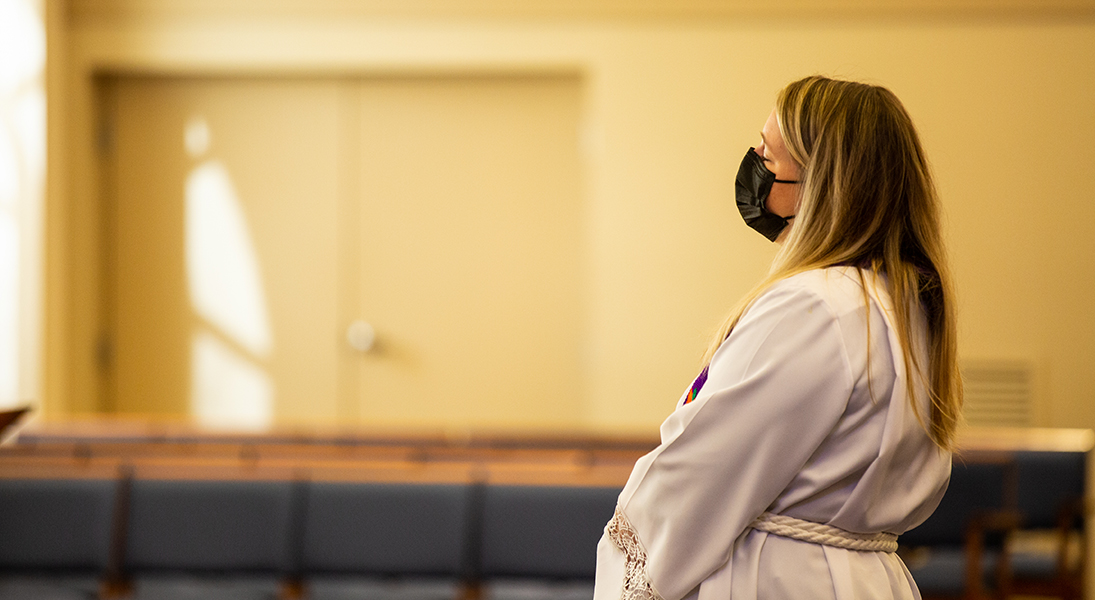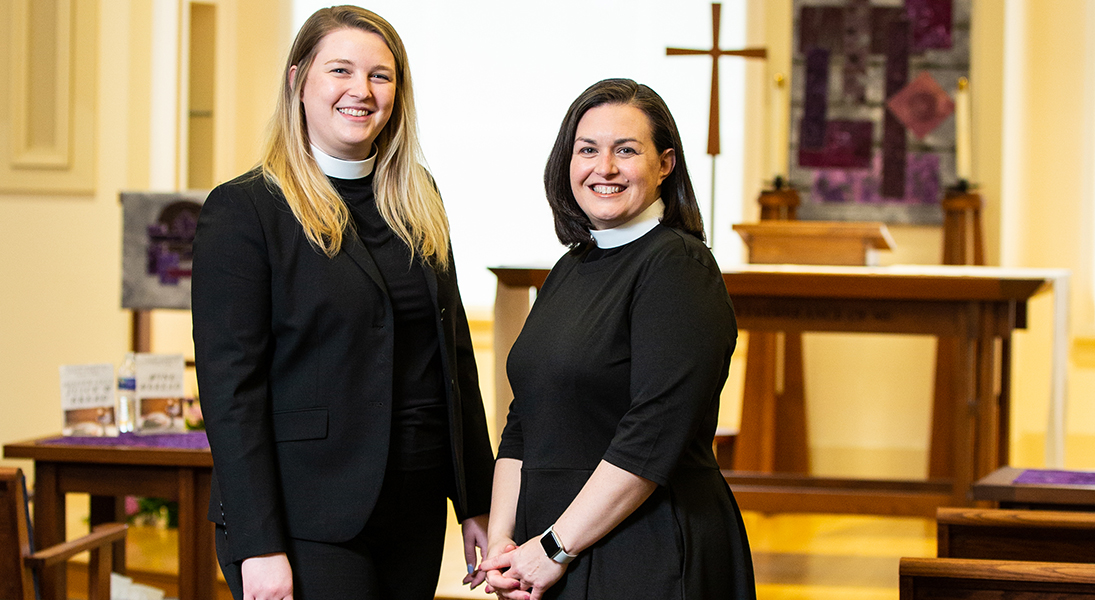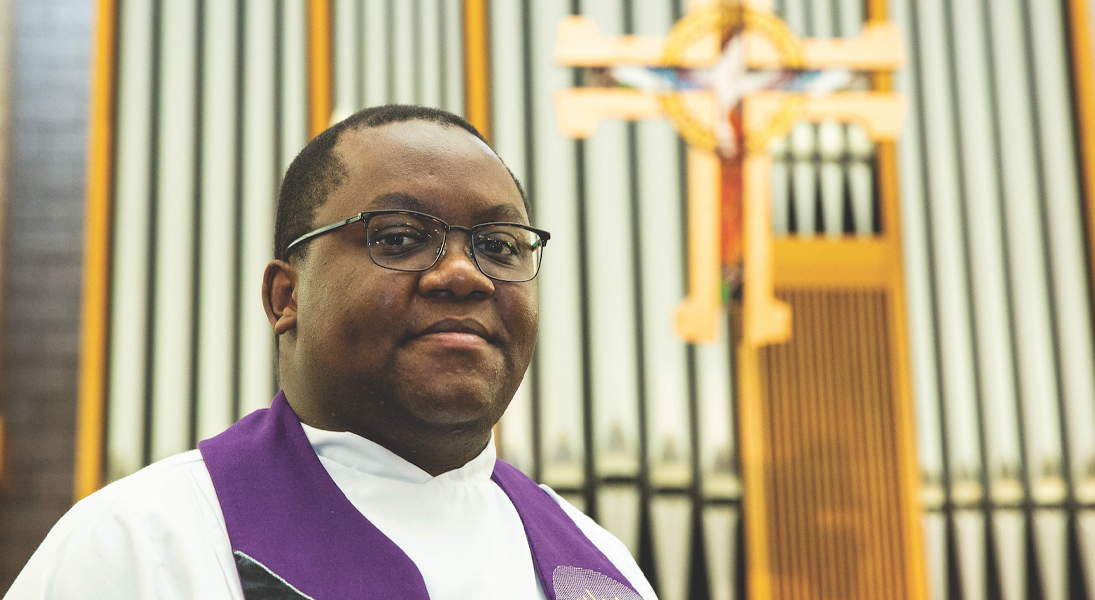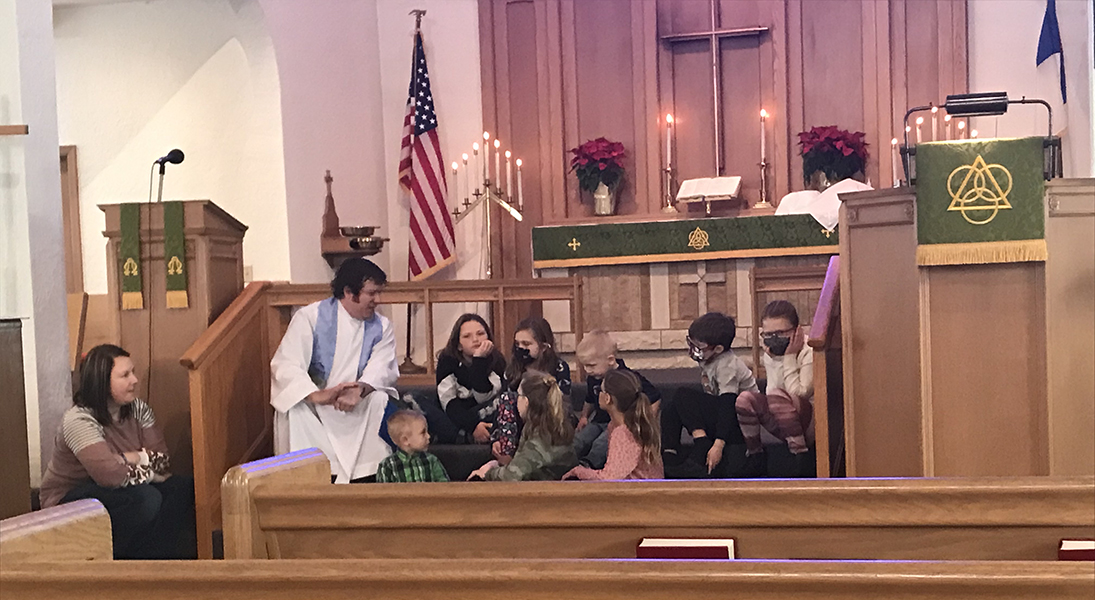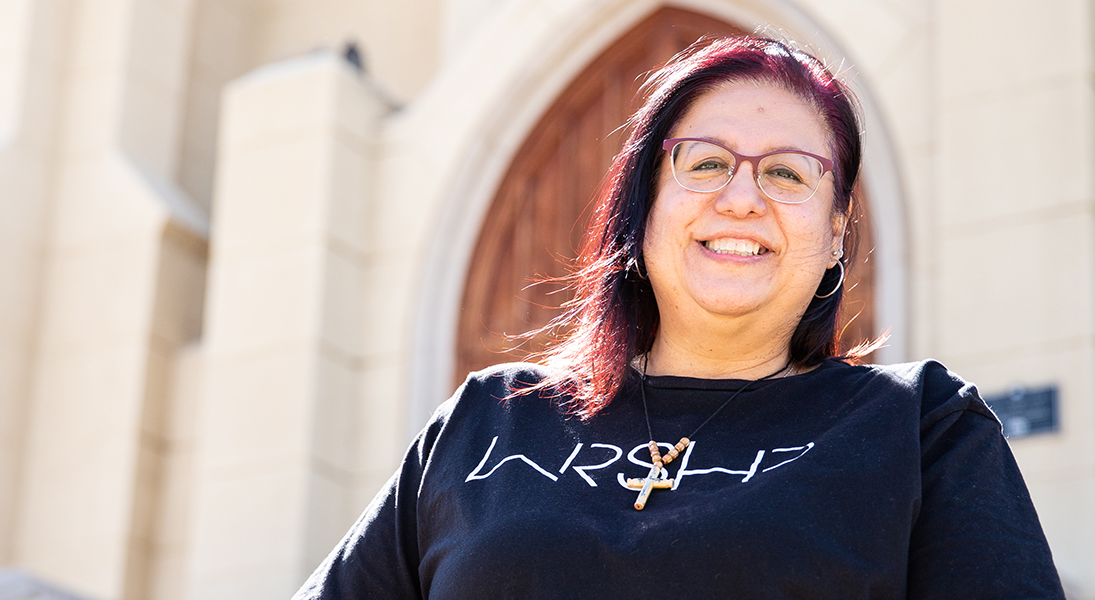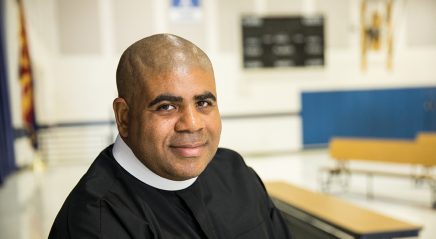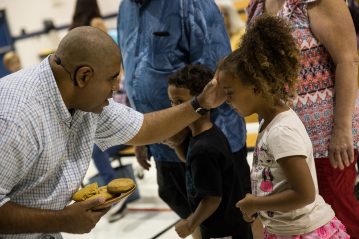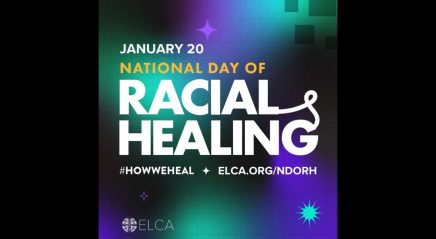“It just seemed like a wild dream.”
That’s how Phyllis Anderson felt in the late 1980s when she and her colleagues began imagining a fund that would cover tuition for students at Lutheran seminaries. At that time she was director for theological education at the newly formed ELCA and seminarians were supported through direct grants from synods. But the economics were changing, she said: educational costs were rising, and seminaries and students needed a different source of support.
From 1988 to 1995, Anderson helped lead a task force seeking a new way to fund theological education in the ELCA. At first, the members thought they might look to congregations to provide scholarships. As they refined that idea, they began thinking, “Maybe we need to go closer to the ground even than that and deal with individuals who have a passion, who always want for there to be pastors.”
That “wild” idea became the Fund for Leaders, established by the church in 1997 to directly fund tuition for ministry candidates at ELCA seminaries. In 2000 the fund awarded its first eight full-tuition scholarships. Now the Fund for Leaders regularly awards 50 full-tuition scholarships per year. Including synodical scholarship recipients, the fund has supported over 1,100 students.
Many of these alums have gone on to become full-time leaders of ELCA congregations. Many more are meeting the needs of their communities in other, innovative ways.
Anderson said the ELCA settled on the Fund for Leaders as the first and most central endowment of the church because “theological education is kind of foundational to whatever else we’re going to do. Yes, we need missionaries. Yes, we need campus pastors. Yes, we need people doing justice work. But we need a way to prepare them. … So many other things depended on a stream of well-prepared leaders.”
As the Fund for Leaders celebrates its 25th anniversary, a few past scholarship recipients looked back on their leadership journeys. Their stories illustrate the difference the Fund for Leaders has made—not just in the scholars’ lives but throughout the communities they serve.
Meredith Lovell Keseley and Kelsey Kresse
When members of Abiding Presence Lutheran Church in Burke, Va., called Meredith Lovell Keseley to serve as their head pastor, they took a leap of faith. “I was relatively young,” Keseley said. “I had a lot of enthusiasm and not a lot of experience.” That was over 12 years ago, and Keseley has led the congregation ever since.
Keseley describes Abiding Presence as a vibrant suburban congregation committed to serving their community both inside and outside the church’s walls. The congregation is also serious about fostering intergenerational relationships, which makes it really special to Keseley. “I am confirming children who I baptized,” she said. “I am marrying people who I confirmed. I am burying people who are beloved to me.”
Being called as pastor and being welcomed into people’s lives here, she added, has been her greatest joy and “a holy privilege.”
Keseley received her Fund for Leaders scholarship just over 20 years ago. She had applied to seminary to realize her childhood dream of becoming a pastor, but she had started thinking about other academic options. Then one day she opened her email and discovered she would receive a full-tuition scholarship. “OK, God, that’s as close to a burning bush as I’m getting,” she remembers thinking. “Point taken.” She enrolled in seminary.
“It frees the students to really listen to God’s voice.”
Through that scholarship, Keseley felt the whole church was cheering her on. “It was pivotal to my seminary experience because it meant that I was not doing this alone,” she said. To this day, she said, she is sustained by that feeling of being supported by a “great cloud of witnesses.”
A few years ago, for the congregation’s 40th anniversary celebration, Abiding Presence established a Fund for Leaders scholarship. Through an endowment, the congregation will award a full-tuition scholarship to a new seminary student every year.
Then in 2021, Abiding Presence called another Fund for Leaders alum, Kelsey Kresse, to serve as its associate pastor focusing on youth and college-age ministries.
Kresse has noticed how committed the congregation is to fostering future leaders: “We don’t necessarily become leaders by accident.” She loves how, at every level, everyone in the congregation is invested in what happens to their young members.
“At church, that’s all we’re here to do,” she said, “to invest in our youth and young adults and to help them develop in their faith and to help them love their neighbor. It’s that intentionality that makes the difference. It made a difference for me.”
Tawanda Murinda
On Thursday evenings, Tawanda Murinda helps lead the discussion group “God Talk on Tap” at a local brewery in Grand Forks, N.D. The group shut down for two years during the pandemic, but meetings began again this winter. On the brutal February night when I attended, about a dozen people in their 20s and 30s, from ELCA churches and ministries across the city, braved the freezing wind and icy sidewalks to be together.
Participants sat around two long tables in a small downstairs room with low ceilings and cheerful paintings on the walls. When everyone was settled, Murinda opened with a personal story. He concluded by asking the group some open-ended questions for discussion, then joined one of the tables. As he sat, conversations began to spark around the room.
Murinda grew up in Harare, Zimbabwe, and came to the United States for college, where he was introduced to the ELCA through campus ministry. After earning his bachelor’s degree, he began studying engineering. Yet he felt called toward ministry.
He then began the application process at Wartburg Theological Seminary, Dubuque, Iowa. But when he thought seriously about how much a seminary education would cost, he realized he couldn’t afford it and abandoned his application.
To his surprise, the Wartburg admissions team reached out to him anyway. They let him know that financial assistance was available through the ELCA Fund for Leaders. Murinda applied and was awarded a full scholarship.
“I’ll be honest,” he said, “without the Fund for Leaders, I would not have become a pastor. That allowed me to do the thing that I thought God was calling me to and to do something that I love.”
Murinda began his newest call at Sharon Lutheran Church in Grand Forks this February. He has lived in the area for several years, though, and has served his community in many ways beyond his congregational work.
In 2020 community leaders raised money to install a memorial marker for Charles Thurber, a Black man killed by a mob of white residents in Grand Forks in 1882. As part of the installation, Murinda led an interfaith memorial service for Thurber, giving community members space to acknowledge violence and injustice together.
Grand Forks is Murinda’s home now, and he feels responsible for making it more welcoming for everyone.
Dennis Rodenberg
Both Olin and Wyoming are small towns in rural Iowa, with populations of fewer than 700 people. Each town has a school, a fire station and one Lutheran church. Every Sunday, Dennis Rodenberg leads services at both of them: St. John in Olin and Zion in Wyoming.
Many members of this two-point parish have been attending services in these stone buildings for decades. Still, when Rodenberg arrived as the first full-time pastor to serve the congregations in five years, he felt a swell of hope and energy in the community.
For a long time, Rodenberg made it his mission to serve the church as an “awesome lay member” and served on his congregation’s call committee. “I wish[ed] I had the guts to say yes to the call that I felt stirring in me,” he confessed. Back then, he had already started a family and a career in transportation and logistics, but in 2017 that call to ministry grew too loud for him to ignore.
“I’m called. That’s all I can say.”
A Fund for Leaders scholarship allowed him to enter seminary without getting another job to pay for his education or worrying about financial debt. He was able to dedicate more time to both his studies and his family.
Rodenberg was also able to spend a month in Germany, studying the rich history of the Lutheran church. He would like to use his connections there to set up an educational exchange program for members of his rural parish. He would also like to give the aging members of his congregations more ways to reach out into the community and “offer God’s relationship to those who have either experienced God in a poor light or not at all.”
Rodenberg recognizes how the Fund for Leaders allows ministers such as him to give themselves over to God’s call. “Fund for Leaders doesn’t just allow for a ‘free’ education,” he said. “It frees the students to really listen to God’s voice.”
Wanda Frenchman
Seventies pop hits regularly serve as a prelude to worship at the Native American Urban Ministry in Phoenix. The night I joined, the laid-back groove of Redbone’s “Come and Get Your Love” provided a soundtrack as ministry members—mostly Indigenous people living in Phoenix—found their chairs in the fellowship hall that the group rents for meetings.
At the beginning of the service, attendees were invited to the altar for smudging. Those who wished to take part in the ritual came forward one by one and stood with their arms outstretched. A leader holding a bowl of burning herbs used a feather to brush cleansing smoke over their bodies. Later in the service, members listened to Scripture and took communion. The postlude was “Love Train” by the O’Jays.
The ministry’s pastor, Mary Louise Frenchman, and her daughter Wanda have shaped this ministry, with its blend of Lutheran and Native American traditions, to meet the unique needs of their community. Mary Louise explains that many Native people have been exposed to a more punishing version of Christianity, “hard on the law, easy on the grace.” She wanted to create a ministry that would welcome them in and offer healing. “I needed a different type of ministry,” she said, “one that would empower people.”
Mary Louise began the Native American Urban Ministry about 10 years ago. Wanda was involved from the beginning and has taken on more responsibilities as the years have gone by. Eventually Wanda decided to continue her leadership journey in seminary. She had noticed the lack of Native American leaders in the ELCA and wanted her community to have a voice in the church. “I don’t know,” she said, “I’m called. That’s all I can say.”
With the support of a Fund for Leaders scholarship, Wanda enrolled in the Theological Education for Emerging Ministries program at Pacific Lutheran Theological Seminary (PLTS). The program allows her to take seminary classes while she continues the leadership work she is already doing in her community.
For Wanda, being a Fund for Leaders scholar is about more than just money. Before she received her scholarship, she didn’t feel much support from her synod or the churchwide organization. Afterward, though, she felt as if the whole church were urging her forward. “That’s kind of what pushed me to be like, ‘OK, now you’re really in it,” she said.
The future of the fund
By the time the first students received their Fund for Leaders scholarships in 2000, Anderson was no longer serving with the ELCA churchwide organization. In that way, she said, “I feel a little bit like Moses.”
She left her position in 1998 for academia and eventually became president of PLTS, which made her the first woman to head a Lutheran seminary in the United States. Still, she was able to watch her work on the task force pay off from a different vantage point, as Fund for Leaders scholars began to arrive at her school.
Anderson said it has been incredible to watch the “little idea” she and her colleagues came up with over 25 years ago grow and make a difference in the lives of students. And she is excited to see what it might accomplish in the future. “There’s no end of imaginative ways that a fund like this could undergird the transition we’re going through,” she said.
The ultimate goal of the Fund for Leaders is to cover all tuition costs for seminary students pursuing rostered leadership in the ELCA. In the beginning, Anderson said, that idea “seemed almost like a joke. [But now], well, that’s not so crazy anymore.”
By the numbers
ELCA Fund for Leaders Endowment as of June 30, 2021: $81,764,456
For the 2021-22 academic year:
Fund for Leaders churchwide scholarships 152
Full Tuition 134
Mission Developer 15
Federal Chaplaincy 3
Total amount to be distributed $2,479,100
Synod and congregation partner scholarships 206
Total amount to be distributed $792,120
Total number of scholarships awarded 358
Students supported 317
Total amount to be awarded $3,271,220
Source: ELCA Fund for Leaders
For more information
The Fund for Leaders supports a future in which all rostered ministers are free from financial debt and are able to serve wherever they are called. To learn more about or to help support the Fund for Leaders, visit elca.org/fundforleaders.
For videos and more about the 25th anniversary, go to elca.org/fundforleaders25.



